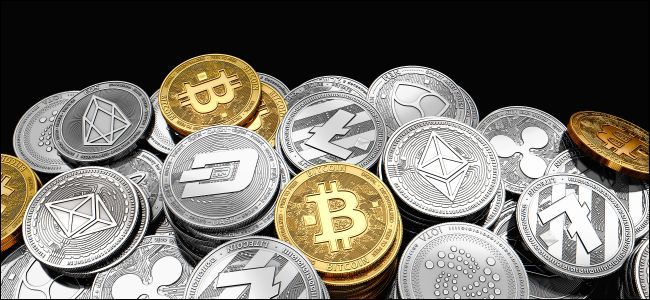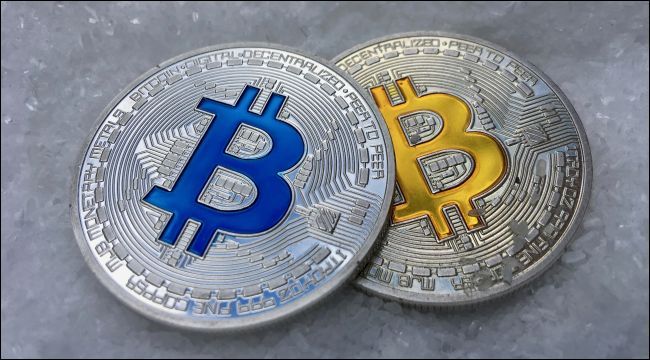Quick Links
Bitcoin was the first cryptocurrency out there, and it's still the biggest---for now, at least. But, as we've explained before, Bitcoin has a lot of problems as a currency. The term "altcoin" refers to any other cryptocurrency that's not Bitcoin---in other words, they're alternatives to Bitcoin.
What Are Altcoins, and How Are They Related to Bitcoin?
Bitcoin is a cryptocurrency, but, technically, it's a few other things. It's software that people run (Bitcoin Core), and an underlying blockchain that keeps track of who has which Bitcoins.
While the concept of a blockchain was invented by the creator of Bitcoin, Bitcoin has no monopoly on blockchain technology. Other people can create their own cryptocurrencies and their own blockchains, and that's generally what cryptocurrencies are.
For example, some of the biggest altcoins you may have heard of include Ether, Ripple, Bitcoin Cash, Litecoin, and Monero.
- Ether: Ether is the cryptocurrency generated by the Ethereum platform, so this cryptocurrency is often also called Ethereum. The Ethereum platform is a ledger technology other companies can build on. For example, CryptoKitties uses the Ethereum platform.
- Ripple (XRP): Ripple, also known as XRP, is owned by a private company. Technically, the company is named Ripple and the tokens are named XRP, but the currency is often called the Ripple anyway. Some banks are using Ripple to settle cross-border payments, but they're basically just sending digital IOUs and settling with traditional money later rather than actually using the XRP tokens.
- Bitcoin Cash: This was originally a fork of Bitcoin, but is now basically a separate currency, despite the name. It has architectural changes that lead to fast transactions and low fees compared to Bitcoin.
- Litecoin: Litecoin was also originally a fork of Bitcoin as well. Litecoin uses a different proof-of-work algorithm that's more intensive on memory, where Bitcoin is more intensive on processing power. Its network tries to complete a block four times as often as Bitcoin, which is designed to speed up transaction confirmation.
- Monero: Monero is designed to be "secure, private, and untraceable". Unlike with Bitcoin, transactions on the blockchain can't be traced back to individual users. This makes it popular for online drug marketplaces.
These are just a few examples. But there are thousands of altcoins, and anyone can create one.
Of course, anyone can create something, call it a cryptocurrency, and try to get people to use it. There's no guarantee the underlying technology is even based on a blockchain or a solid distributed trust network just because someone's throwing the word "cryptocurrency" around.
To make things a little more confusing, some altcoins are even based on Bitcoin---kind of. For example, Bitcoin Cash was created by taking the existing Bitcoin code and modifying it, and going in a different direction. This is known as a "fork", and it also resulted in a fork in the blockchain.
Bitcoin Cash now has its own separate blockchain that inherited the main Bitcoin blockchain's history, which is why everyone who owned Bitcoin at the time of the fork also gained an equal amount of Bitcoin Cash. As Bitcoin is open source, anyone can do this. Although the community trusts the Bitcoin Core developers at the moment, it's possible that in the future the enough people could lose trust in them and switch to software provided by different developers working on the Bitcoin code. That would then become the new "Bitcoin". It's all decentralized like that.
So, if anyone can create altcoins or fork the Bitcoin blockchain, what causes them to have any value instead of them falling flat and being ignored? Like with Bitcoin and everything else in life, altcoins merely have the value people place on them.
Why Do People Keep Creating Altcoins?
So why do people keep creating altcoins, anyway? Well there are two answers to that question, depending on how cynical you want to be.
The technical reason is that Bitcoin has inherent problems due to its design, and people feel they can improve on it. For example, Bitcoin transactions have high fees and can take a significant amount of time to process, so some altcoins are designed to have lower fees and faster processing times. The "proof of work" requirement that requires a ridiculous amount of energy usage could be replaced with a different verification method, making the new altcoin more efficient and saving all the world's energy from being sucked up to mine Bitcoin the way nanobots may one day suck up all the world's matter in a grey goo nightmare scenario. Some altcoins, like Monero, are more anonymous by design, which attracts people who want to buy drugs online, for example. People who like the idea of cryptocurrency but think Bitcoin has serious technical problems are attracted to altcoins as a solution.
The other, more cynical reason is less technical and more monetary. As Bitcoin has increased in value, more people look at the cryptocurrency market with dollar signs in their eyes. If they could make a new currency and get in on the ground floor when it can be easily mined, they can sell it after it takes off in value and make a bunch of money.
There appears to be a lot of irrational exuberance in the marketplace, which encourages the formation of altcoins. Dogecoin, for example, is an altcoin originally created as a joke in 2013. It's named after, and has a logo featuring, the popular Shiba Inu "Doge" meme. It's been used for tipping in online communities in the past. In December 2017, even after it hadn't been updated or actively developed in years, people bought into it and the total of all the Dogecoins in the wild became worth a billion dollars. Jackson Palmer, Dogecoin's original founder who left the project in 2015, commented critically on the development:
I have a lot of faith in the Dogecoin Core development team to keep the software stable and secure, but I think it says a lot about the state of the cryptocurrency space in general that a currency with a dog on it which hasn't released a software update in over 2 years has a $1B+ market cap.
In altcoins, many investors are looking for "the next Bitcoin" that will have a dramatic increase in value. That money is driving up the market value of these altcoins.
Altcoins Appear to Go Up and Down With Bitcoin, Anyway
There's a big problem with how altcoins play out in the market, if you're looking at them as an (unsafe) investment. The value of altcoins appears tied to Bitcoin's value. You might expect that, given Bitcoin's technical problems, altcoins might go up in value when Bitcoin goes down. But, over and over, we've seen that the opposite is true. When Bitcoin goes down, altcoins tend to go down, too.
All we're saying is: Don't treat altcoins like an alternative to Bitcoin that will help you diversify your portfolio. The cryptocurrency market seems to be all just one big game of gambling on one market. These cryptocurrencies all seem to go up or down together, with the altcoins following Bitcoin's lead.
Bitcoin Is Just One of Many Cryptocurrencies
Altcoins do demonstrate one important thing about Bitcoin. Even if the blockchain is a great innovation (and it is, for some things) and cryptocurrency is the future (we'll see), that doesn't guarantee that Bitcoin is part of that future.
Bitcoin was the first cryptocurrency, and it's still the biggest one. However, it has serious technical problems that prevent it from being a good currency, which is why all the Bitcoin fans are arguing it's a "store of value" and not a currency anymore.
There's nothing special about Bitcoin that forces people to use it if something better comes along. Even if cryptocurrency is the future and every piece of data will be stored on a blockchain, Bitcoin could still become worthless and get left behind as people switch to altcoins---either current altcoins, or the altcoins of the future. What gives Bitcoin its value, whatever that value is at the moment, is that people believe it has value. If enough people agree on an altcoin that they like better, Bitcoin could be abandoned.
Image Credit: Wit Olszewski/Shutterstock.com, Adrian Today/Shutterstock.com, arakio/Shutterstock.com



